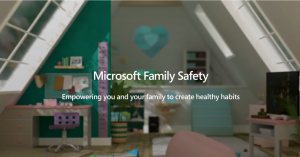In 2015 Max Wheeler’s life was Mobile Data Labs, working on an app that provided stress-free mileage reports for business drivers and the enterprises employing them. It was then that Microsoft, citing an ambition to “reinvent productivity and business process in a mobile-first, cloud-first world,” acquired the San Francisco-based company.
After a few years of fine-tuning the app within Microsoft, Wheeler and the team heard the Family Safety team, which empowers parents to use screen time limits and other features to monitor and protect loved ones online, needed a mobile solution. As a group of family-minded folks, the team jumped at the opportunity. The team previously tasked with tracking miles offered up their growth mindset and human-centered design talents to create 1.0 versions of the Family Safety apps for iOS and Android.
Now nearly two years later, the team is called Modern Life Experiences (MLX) and has made a name for itself researching and developing customer-focused projects. We recently caught up with Wheeler to discuss the journey, one which serves as a reminder that adaptability can lead anywhere, human-centered design never goes out of style, and empathy impacts experience.
Innovation and transformation

“It’s been a pretty epic journey,” the director of engineering says, reflecting on his team’s post-acquisition evolution. “For us to come in responsible for a narrowly focused app, then adapt to solving customer needs for families worldwide, it’s been about figuring out how we operate as a startup within a large company. Thankfully, there is a lot of flexibility for innovation-minded individuals and teams to do cool things within Microsoft, and the Bay Area sets the stage for that.”
“We feel passionate about this,” he says of the Family Safety effort, transforming what was once a Windows feature into a cross-platform digital and physical safety tool. “Because we have families, we know this customer base and felt like we could adopt the mobile apps. When the possibility arose, we weren’t in the same organization but felt like it was a great fit. It’s an example of our innovation bias — we don’t think about boundaries. We think if it’s a great opportunity and we’re the right team, let’s go for it.”
That same ethos carried the MLX team into another new realm last year when it saw an opportunity to expand Excel.
“We took learnings from Mobile Data Labs about turning data into value for users and asked if we could do the same thing for financial data,” Wheeler says of Money in Excel. This add-on allows users to automatically connect bank, credit card, investment, and loan accounts to Excel. “Could we take your financial data and turn that into more value for you than your bank or credit cards are giving you now? It was released last June and quickly became one of the most popular Excel templates out there. It goes to show, that when we recognize where there’s a need, there is the opportunity here to meet that customer demand and then quickly iterate.”
Bay area adversity
When it comes to building and maintaining the team, Wheeler says that finding others who share the MLX mindset isn’t just a mandate — it’s a given. In the Bay Area, a region where startups can launch or fold overnight, finding this kind of talent is easier than you might expect.
“Our hires need the agility to respond to the market and customers, and they need to be comfortable with ambiguity because some giant document won’t answer everything before they get to work,” he says. “Such things seem to be Bay Area values, so we don’t need to interview for them. By looking at someone’s vast experience, we can assume that way of thinking is something they will bring to the table to make an impact quickly.”
After a while, Wheeler says, you tend to take such intrinsic personality traits for granted. But elsewhere, it’s not as common as you might think.
“When you go out into the world, you realize this isn’t ubiquitous,” he adds. “Not everyone is like this.”
Empathetic obsession
“What has been universal, both in the members of the team that came in through the acquisition and then afterward, is that we have a natural affinity towards customer interaction,” Wheeler says of life in a department that deals directly with the people who they hope to impact. “Human-centered design means nobody in the middle. We are customer-obsessed because we talk to them and then build with their input.”
Such effort is personal and uses the word “obsessed” for good reason.
“I don’t know how many videos I’ve watched of people at home, parents at home, their kids crawling all over the place,” Wheeler explains. “It’s super-impactful for the whole team, as we play these videos and get a deep-dive into the experience a family might have. Or, for Money in Excel, what challenges they might have in managing their money. You get that real customer empathy by being so close to them.”
The MLX team is currently hard at work expanding that empathy beyond borders. Understanding other communities around the world and what they need in Family Safety apps or Money in Excel spreadsheets or whatever comes next requires a sincere effort in getting to know them. Luckily, such things come as second nature to the versatile, customer-obsessed MLX team.
“When you get a product out into the market, your eyes are opened up by actual feedback you get from users. Some you ask for, some they volunteer, but they’re not shy telling you what they think, and you can’t overstate the value of that. Once those channels get going, it’s truly a magical thing.”
If you’re customer-obsessed and interested in joining a team like MLX focused on delivering products with a human-centric design, opportunities can be found here: https://aka.ms/MicrosoftBayAreaCareers.




